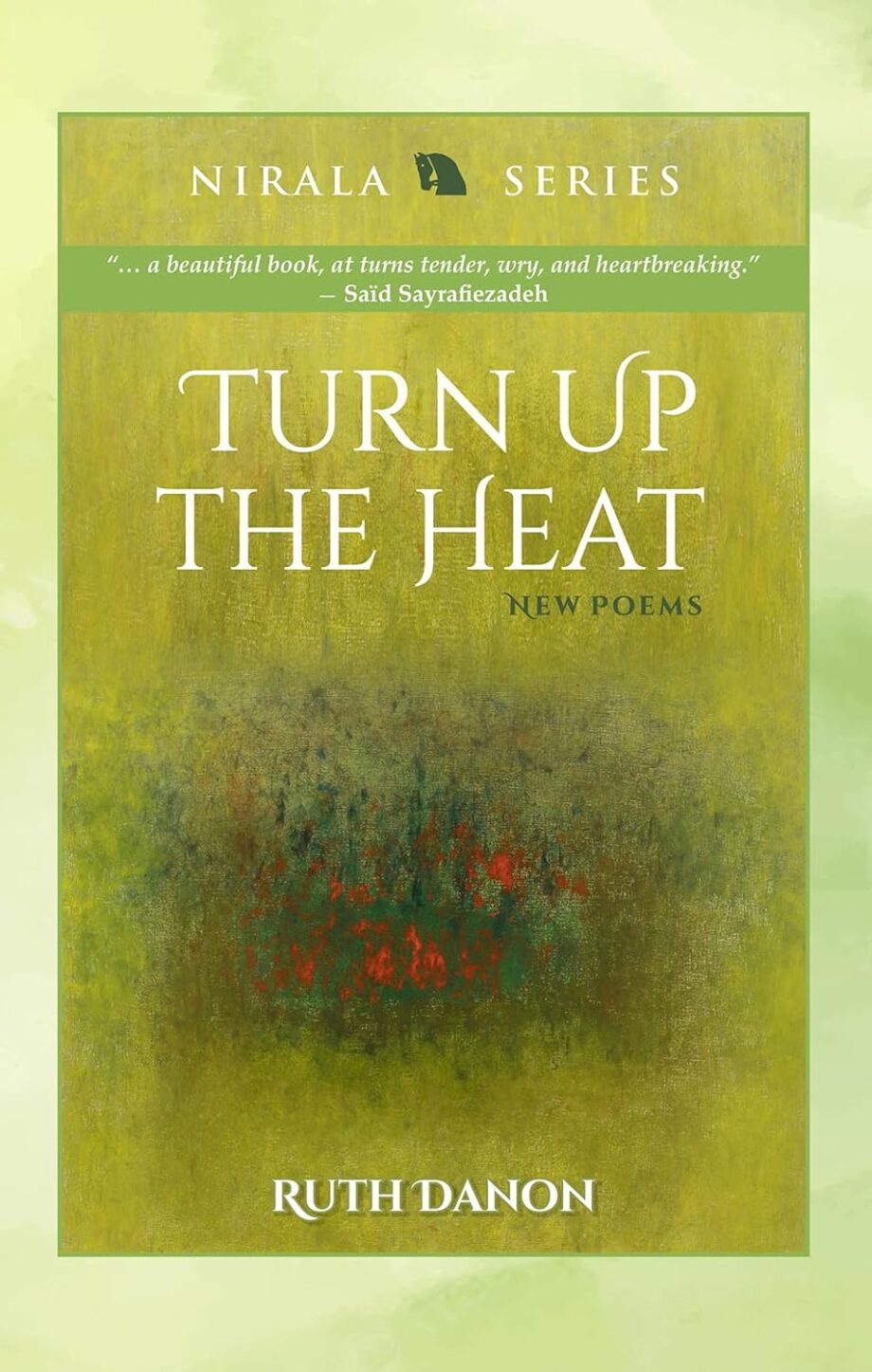Reviewed by Sandra Fees
Turn Up the Heat
by Ruth Danon
Nirala Publications
May 2023, Paperback, 84 pages, ISBN-13:978-8195781645
In her newest collection, Turn Up the Heat, Ruth Danon searches for consolation in a disquieted world. Light and heat serve as central metaphors for comfort. They represent the warmth Danon so desperately craves as an antidote to the cold she fears. Her fear is deeply rooted in the uncertainty and anxiety that accompany illness and hospitalization. The collection’s title poem, “Turn Up the Heat,” warns that comfort, even physical warmth, can be hard to come by.
Those who know me know
that I fear nothing more than I fear
cold.
…My need is to avoid cold. My need
is not to be afraid of what I fear.
…In the hospital where
I spent too much time I begged
for warm blankets. Sometimes
they had them. Sometimes not.
This fear of cold is also associated with aging, grief, alienation, and the vicissitudes of marriage. Paradoxically, the very heat that can heal can also destroy. The entire planet faces the threat of being burned up by global warming and backward ideas.
Nevertheless, in the poem “Confusion of Tongues” it is “light and heat, heat and light” that provide “the constellations of words” that ground Danon and her work
:
When I said “constellation” my friend heard “consolation”
and my friend was not far wrong. I was talking about the
constellations of words that form the grounding of my so-called
work (life), my consolations. Thus: light and heat, heat and light,
light and air, water and light, fire and light, air and light, light
and light.
The confusion of the words “constellation” and “consolation” is fortuitous. Both bring light to the world. So too does the Renaissance philosopher Giordano Bruno who figures prominently in the collection. Bruno was a forward thinker, far ahead of his times. He believed in many worlds. The poem “Against Nostalgia” celebrates his expansive, visionary worldview of:
infinite suns and infinite
earths, manifest and immanent. Bruno saw far into the future, could
almost see the black holes and retreating galaxies of our own time.
For that belief and for his unwillingness to recant, Bruno was burned at the stake. Even the poet who aches for fire must acknowledge that “. . .it hurts to burn.”
St. Anthony of Egypt serves as another source of light. Living in the third century, St. Anthony overcame spiritual longing by retreating to the desert. There he embraced a life of solitude and peace, the very consolations Danon seeks. In her poem “The Gamble,” Danon admits with something akin to regret that St. Anthony was a saint “I should have / named my own.”
Danon arranges the collection to further illuminate her ruminations. Mirroring the poet’s experience of anxiety and disquietude, there is an absence of section breaks and the inclusion of a wide variety of styles and forms. From lyric to prose poems, from short-lined couplets to long lines that flow across the page, Turn the Heat Up reminds us not to get too comfortable.
This same feeling of disruption arises in individual poems. While they draw us in with deceptive ease and careful attention to language, just when we think we know what will happen next, the poems take surprising leaps. We discover there is more to the story and that we can’t possibly anticipate how the future will turn out—the poet’s, our own, or the planet’s. In the poem “Shift,” Danon commiserates with us: “If I could tell you what happens next, I would.”
What Danon does know is that there are some consolations to be had. There is writing and truth, compassion and beauty. There is light. And surprise. What she knows is that we make a life from what we have. In “Verdict,” the final poem in the collection, comfort comes from noticing that
You make do
with what you have and who
you are. The light outside
… surprises you.
What we have, if we are wise enough to see, are the small, startling moments of our lives. A glimpse of a cardinal, the morning sky, brushing our hair, a small pond, a stone, bees—any of these can yield amazement. “The Narrative Frame {revised}” describes one such moment, one that is ordinary, yet “visually arresting.” When a striped cat starts sleeping on a cream couch,
This new habit
of the cat can be called a happy event, a swerve
in the continuum, what might in a text, be called
a poetic event. That, in a plotless life, is what
we live for.
“What we live for” is that “swerve in the continuum.” What matters is that we are always on the brink of a new narrative, that we are ever edging toward truth and beauty, ever drawing closer to the light. In “on the brink,” Danon insists that what matters is that we go on. What matters
is light:
its breaking
as one day falls
into another.
About the reviewer: Sandra Fees is the author of two chapbooks, The Temporary Vase of Hands (Finishing Line Press, 2017) and Moving, Being Moved (Five Oaks Press, 2017). She is a past poet laureate of Berks County (2016-2018). In addition to poetry, she writes creative nonfiction with a piece forthcoming in The Citron Review. Her poetry book reviews have been published by Tupelo Quarterly and The Laurel Review. She is president of Berks Bards, which hosts a local monthly featured poet and open mic series in Reading, Pennsylvania, as well as a poetry reader for The Common Ground Review.












